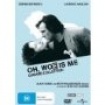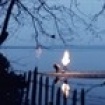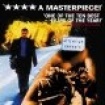PRAVDA
| 片名: | PRAVDA |
|---|---|
| 其它片名: | 真理 |
| 导演: | Jean-Luc Godard, Jean-Henri Roger, Groupe Dziga Vertov, Paul Burron |
| 编剧: | Jean-Luc Godard |
| 制片人: | Claude Nedjar |
| 主演: | Jean-Luc Godard, Vera Chytilová |
| 片长: | 58分钟 |
| 年份: | 1970年 |
| 类型: | 纪录片 |
| 国别: | 西德国/法国 |
| 语言: | 法国 | 捷克 | 英语 |
| 格式: | |
| 制作机构: | Centre Européen Cinéma-Radio-Télévision (CECRT) |
影片概述 . . . . . .
Essentially a travelogue of images of the Soviet Union, coupled with a voice-over narration explaining the current political climate of Eastern Europe, delivered by an unaccredited North American voice actor who presents his findings in a formal, matter-of-fact approach that suggests the dictation of a letter. Again, this is a filmed essay; an investigatory piece looking into the whys and wherefores of certain socialist issues of class and employment, and how such factors contribute to a recognisable way of life. This involves everything from cars, jobs, homes and industry; all presented as a rolling collage of images that repeat themselves throughout the course of the film, as the discourse on the soundtrack continues. Although it has some merit as a period piece, this is probably one of the least interesting films from The Dziga Vertov Group; the outlet for collaboration between filmmakers Jean Luc Godard and Jean-Pierre Gorin to analyse certain Marxist-Leninist concepts within the cinematic medium, resulting in a collection of films that are either mildly interesting or completely forgettable, depending on the tastes of the particular viewer.
Pravda (1971) - the title being the same as a leading Soviet/Russian newspaper, previously referred to in Godard's own pop-art science fiction film Alphaville (1964) - in which the translation, "The Truth", is used as an ironic comment on the part of the filmmakers to the images and ideas on screen, works towards an often slyly amusing contrast between the pictures we see and the voice we hear underlining the intentions of the filmmakers in their quest for understanding. It is presented as a collection of seemingly found images, conspicuous in their typically bold use of colour and composition, which at times recall Godard's more iconic films such as Made in U.S.A. (1966) and 2 or 3 Things I Know About Her (1967), combined with the use of still photography, archive footage, TV clips and disarming bursts of music. The film-making devises are all emblematic of Godard's work, both before and after his time with the Dziga Vertov group, and show the definite stamp of authorship that belies the group manifesto and their rejection of the auteur-based cinema that Godard helped to define.
Unlike other films produced by Godard and Gorin during this highly productive period, Pravda simply doesn't hold up to repeated viewings. Whereas projects like Un Film comme les autres (1968), Vladimir and Rosa (1970), Tout va bien (1972) and Ici et ailleurs (1976) (the latter produced from the remnants of an aborted Dziga Vertov project that conspires to pick apart the failings of these particular films) managed to overcome the limitations of their political ideologies and the complete disregard for the recognisable conventions of film-making to show the evolution of Godard from a too-clever-for-his-own-good cinephile into some kind of continually probing film poet; mixing words and images to create deeply felt investigations into love, war, death, religion and the complexities of the human condition. Pravda, on the other hand, is simply an information piece. Unless you're incredibly interested in 1960's politics or montage-film-making then there's very little here to keep you occupied; with the continual collection of images and constant reliance on voice-over narration to supply information and opinion eventually becoming tiring, even from the perspective of a dedicated admirer of Godard's work, such as myself.
Although films like Vladimir and Rosa (1970), Tout va bien (1972) and Ici et ailleurs (1976) are incredibly exhausting experiences, filled with dense thought, expressions and rejections of conventional film-making, they reward repeated viewings with a style and conviction that is unlike anything else presented in contemporary cinema. Later, Godard would reject many of these Dziga Vertov films as a naive attempt to make sense of things, while the film-making techniques would be refined in the eventual films that he made in collaboration with Anne-Marie Miéville, such as Numéro deux (1975), Comment ça va? (1976) and the twelve part television series France/Tour/Detour/Deux/Enfants (1978), some of the most probing, challenging and fascinating works of Godard's career. Pravda is the Dziga Vertov group at their most obvious; there's none of the bold film-making experiments of Vladimir and Rosa or the daring aggression of the incredibly flawed Wind from the East (1969), with the whole thing simply becoming a largely quaint collection of sounds and images. As a result, it will probably be of incredibly limited interest to the majority of viewers, Godard fans included.
Pravda (1971) - the title being the same as a leading Soviet/Russian newspaper, previously referred to in Godard's own pop-art science fiction film Alphaville (1964) - in which the translation, "The Truth", is used as an ironic comment on the part of the filmmakers to the images and ideas on screen, works towards an often slyly amusing contrast between the pictures we see and the voice we hear underlining the intentions of the filmmakers in their quest for understanding. It is presented as a collection of seemingly found images, conspicuous in their typically bold use of colour and composition, which at times recall Godard's more iconic films such as Made in U.S.A. (1966) and 2 or 3 Things I Know About Her (1967), combined with the use of still photography, archive footage, TV clips and disarming bursts of music. The film-making devises are all emblematic of Godard's work, both before and after his time with the Dziga Vertov group, and show the definite stamp of authorship that belies the group manifesto and their rejection of the auteur-based cinema that Godard helped to define.
Unlike other films produced by Godard and Gorin during this highly productive period, Pravda simply doesn't hold up to repeated viewings. Whereas projects like Un Film comme les autres (1968), Vladimir and Rosa (1970), Tout va bien (1972) and Ici et ailleurs (1976) (the latter produced from the remnants of an aborted Dziga Vertov project that conspires to pick apart the failings of these particular films) managed to overcome the limitations of their political ideologies and the complete disregard for the recognisable conventions of film-making to show the evolution of Godard from a too-clever-for-his-own-good cinephile into some kind of continually probing film poet; mixing words and images to create deeply felt investigations into love, war, death, religion and the complexities of the human condition. Pravda, on the other hand, is simply an information piece. Unless you're incredibly interested in 1960's politics or montage-film-making then there's very little here to keep you occupied; with the continual collection of images and constant reliance on voice-over narration to supply information and opinion eventually becoming tiring, even from the perspective of a dedicated admirer of Godard's work, such as myself.
Although films like Vladimir and Rosa (1970), Tout va bien (1972) and Ici et ailleurs (1976) are incredibly exhausting experiences, filled with dense thought, expressions and rejections of conventional film-making, they reward repeated viewings with a style and conviction that is unlike anything else presented in contemporary cinema. Later, Godard would reject many of these Dziga Vertov films as a naive attempt to make sense of things, while the film-making techniques would be refined in the eventual films that he made in collaboration with Anne-Marie Miéville, such as Numéro deux (1975), Comment ça va? (1976) and the twelve part television series France/Tour/Detour/Deux/Enfants (1978), some of the most probing, challenging and fascinating works of Godard's career. Pravda is the Dziga Vertov group at their most obvious; there's none of the bold film-making experiments of Vladimir and Rosa or the daring aggression of the incredibly flawed Wind from the East (1969), with the whole thing simply becoming a largely quaint collection of sounds and images. As a result, it will probably be of incredibly limited interest to the majority of viewers, Godard fans included.
导演阐述 . . . . . .
获得奖项 . . . . . .
评论列表(0) . . . . . . ( 发表新评论 ) ( 更多评论 )
幕后花絮 . . . . . . (上传花絮) (展开所有)
影片图集 . . . . . . (更多/我要上传)
相关视频 . . . . . . (更多/我要分享)
对本影片资料作出贡献的会员 . . . . . .
4444(创建者)
















































































